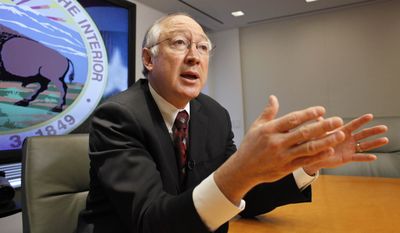Salazar challenged over wolf delisting

WASHINGTON – Interior Secretary Ken Salazar’s decision to stick with a controversial Bush administration move that took gray wolves off the endangered species list in most of the Northern Rockies reflects the independent streak that has defined his career. But it has alienated key Obama administration allies, including environmentalists and some lawmakers on Capitol Hill.
Salazar’s March 6 decision surprised environmental leaders as well as some of the administration’s traditional opponents, and it provoked a protest letter from 10 senior House Democrats as well as a literal howl of delight from Idaho Gov. Butch Otter.
While the White House declined to comment on Salazar’s move, it has clearly caused a headache for the administration. Lawmakers have called senior Obama aides to question the decision, environmental groups have filed a Freedom of Information Act request to probe the decision-making process, and experts inside and outside the administration predict that the issue will end up in court.
If the episode highlighted the delicate path that Salazar, a former senator, is navigating in his new job, it also underscored the learning curve that Cabinet members – especially those who came from politics – face when joining another politician’s administration.
Transportation Secretary Ray LaHood, a former House member from Illinois, veered off message last month when he suggested that the administration might tax motorists for every mile they drive. The White House made clear that the idea was not under consideration.
And Secretary of State Hillary Rodham Clinton, a former senator from New York, clarified the administration’s commitment to human rights last week after stating earlier that such concerns “can’t interfere” with issues on which the United States needs Chinese cooperation.
Norman Ornstein, a resident scholar at the American Enterprise Institute, said Cabinet members often show flashes of independence during the early days of an administration, especially if they have served in the House or the Senate, “where they’re used to making their own decisions and going ahead with them.”
“It takes a while to get your sea legs on that front, especially if you’re a member of Congress,” Ornstein said.
The wolf proposal was published just weeks before Bush left office, then suspended under a broad directive by White House Chief of Staff Rahm Emanuel.
Interior spokeswoman Kendra Barkoff said Salazar had followed the unanimous recommendation of Fish and Wildlife Service scientists in setting the new policy, rather than letting political factors influence him.
“This was a decision based on science,” she said.
Some environmentalists and congressional Democrats are unhappy that Salazar cleared the way for hunting of the once-imperiled wolves just days after President Barack Obama declared his support for federally protecting vulnerable species.
“Making the decision to adopt the Bush administration’s flawed delisting proposal the same week that the president pledged his commitment to the Endangered Species Act certainly calls into question whether the Interior Department was coordinating as closely as one would expect to have done with the White House,” said Bob Irvin, senior vice president for conservation programs at the advocacy group Defenders of Wildlife. “This was a controversy that did not need to happen.”
One House Democrat, who spoke on the condition of anonymity, framed it in even more blunt political terms. “I just don’t see what this does for us,” the lawmaker said. “Here we are alienating people who did the most – who did a lot to help us in the last election.”
The move pleased many elected officials in Idaho and Montana, whose states have the largest numbers of gray wolves and who had pressed the Interior Department to turn management of the animals over to them. Interior kept wolves on the endangered list in Wyoming, saying that state’s management plan failed to pass muster, while also taking them off the list in parts of Washington, Oregon and Utah.
“It was a good sign for folks out here who were a little worried about having a Democratic administration hit the restart button on the conservation and environmental wars of the 1990s,” said John Foster, spokesman for Rep. Walt Minnick, D-Idaho. “I can’t emphasize how important it is to have a Western rancher as secretary of the interior.”
Otter, the Idaho governor, had hailed a similar Bush delisting proposal in 2007 by telling a crowd of hunters that, as soon as federal protections were lifted, “I’m prepared to bid for that first ticket to shoot a wolf myself.” He reiterated this goal to a group of local reporters March 6, after howling like a wolf and smiling.
Rep. Norm Dicks, D-Wash., who chairs the House Appropriations interior and environment subcommittee, led nine other House members in asking Salazar on Thursday to postpone finalizing the delisting rule for at least 60 days.
“I don’t think they took enough time to evaluate the science,” Dicks said.
But Barkoff indicated that Salazar plans to let Idaho and Montana take control of the wolves’ welfare, adding, “Secretary Salazar will carefully monitor the management of gray wolves in those states where they were delisted.”